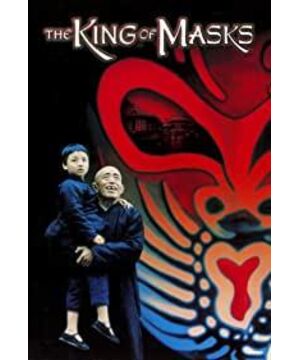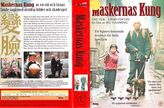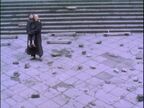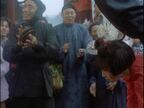I haven't cried in a movie for a long time. I haven't watched "A Hundred Birds Towards the Phoenix", I didn't expect its director Wu Tianming to be so powerful.
"Changing Face" is one of the representative works of Director Wu's artistic creation peak, which was released in 1995. "Changing Faces" has a high degree of completion, integrating the Bashu folk culture with the twists and turns of family affection. There are bright spots in every scene, and every turning point is heart-wrenching.
Bashu folk culture
Bashu architectural style
So far, I have traveled to many ancient towns in China. For laymen watching the excitement, I actually feel that all ancient towns are similar. Especially after staying in the ancient town of Dali for a week, I don't want to visit the ancient town anymore. In Sichuan, most of the famous ancient towns have been visited. Because my grandfather was a history professor, during the summer vacation in elementary school, he took me to and from various ancient towns in Sichuan. The bar street on the other side of Jiuyan Bridge also has the ancient architectural style of Sichuan style. When I was a child, I still sketched there. The memory is too distant and vague to distinguish the ancient town of Sichuan from other ancient towns in words. But in the film, the rendering of architectural styles everywhere, coupled with the gentle drizzle, made me sure that this is the ancient town of Sichuan. Mixed with memories to feel the film, there is even an immersive experience.
As a non-architecture student, feel free to talk about my feelings.
In Chengdu, if you walk around Kuanzhai Alley, you can basically feel the architectural style of Sichuan. Kuanzhai Alley is an ancient street in the Qing Dynasty, which is very similar to the overall architectural style in the movie.
In Jinli, you can see this kind of double-layered stage. This kind of stage is very common in ancient towns in Sichuan, and it also appears in movies.
The building of Zuixianlou in the movie is still used today. In the appearance of some living squares and restaurants in Chengdu, the shadow of this style can be seen.
People and History of Bashu
"Lord Ge", the face-changing king often calls himself that. In fact, in the Sichuan dialect, it means "I", at most with some Jianghu tone. Seeing that the subtitles typed out "Ge Lao Tzu" seriously, I felt funny and warm. There are many such Trumps in the movie dialogue.
Punch. The "formulas" of boxing are not the same everywhere, and I basically don't understand haha. The drinking and punching in the movie is actually a background sound. Just that short punching sound suddenly reminded me of a bunch of old Chengdu people wearing vests with their belly exposed, one foot on a chair and the other on a slipper, drinking while drinking. Screaming out loud and completely incomprehensible.
Leshan Giant Buddha. I have visited the Leshan Giant Buddha several times, and every time I am shocked by the grandeur and solemnity of the Buddha and the river. There are not many scenes of the Buddha in the film, but it conveys a kind of Buddha nature and Zen. People are too small in front of the Great Buddha.
The Sichuan Army and the Republic of China. The background of the film's story takes place in the 1920s, during the period of the Republic of China when the warlords were fighting.
Face-changing and Sichuan Opera
Face-changing is the representative of Sichuan Opera. Even if you are not interested in drama, you have seen face-changing more or less. Every year during the Spring Festival, various traditional performances are held in major parks. When I was a child, I went to my grandfather's house and felt the festive atmosphere in Jinli Wuhou Temple Nanjiao Park. Face-changing is naturally a must-have program for the Spring Festival. Occasionally, face-changing can also be seen in some restaurants as an entertaining show.
I don't know much about Sichuan Opera, so I won't say much. In the film, Liang Sulan, the famous actress of Sichuan Opera, has superb acting skills, treats people with kindness, and has everyone's demeanor. Some people commented that they saw Cheng Dieyi's shadow on Liang Sulan's body. It turned out that Wu Tianming was Zhang Yimou's teacher... The whole movie, based on the background of the Bashu society at that time, revolved around a girl and an old artist. True Love Dog Baby and the Face-changing King: Calling Grandpa, it is the forever grandfather, the old bachelor's face-changing king, eager to find a grandson to inherit the mantle, and came to the "Children's Market". The dog baby was chained by the traffickers, with big eyes flashing, and the loud and clear grandfather moved the face-changing king, and he bought the dog baby at a high price.
The face-changing king takes good care of the dog baby. When the dog was sick, the face-changing king sold the ancestral sword to treat the dog. Gouwa is filial to her grandfather and helps her grandfather on the ship of the face-changing king.
Until an accident, the dog baby confessed to the face-changing king that he was a girl. The face-changing king was furious. His craftsmanship has always been passed down from male to female, from inside to outside. He was deceived by a little girl. The dog baby cried to the face-changing king, because he was a girl and was disliked everywhere, only the face-changing king treated her well. After the face-changing king calmed down, he no longer recognized the grandson of Gouwa, and asked Gouwa to call him the boss, and Gouwa worked under the face-changing king. Although angry, the face-changing king still put on the girl's red cotton jacket for the dog baby, and also had a braid on his head. The dog baby can endure hardship, and goes around with the face-changing king. The face-changing king strictly requires dog babies in terms of morality, and does not allow dog babies to steal chickens and touch dogs. The relationship between the two became more and more harmonious, and the face-changing king also took the dog to the theater.
Gouwa is not convinced, and hopes that the face-changing king can teach her the unique skills of face-changing. She said: Bodhisattva has breasts and is a woman, why do you want to make offerings to her? She took out the face-changing mask while the face-changing king was away, and checked the fire carefully, but she did not expect that the mask caught fire and burned the face-changing king's boat.
The dog baby was so ashamed and remorseful that he left the face-changing king and begged for food on the street. Abducted by traffickers again. In the trafficker's home, she met Tianci, the youngest son of a dignitary. Gouwa escaped from the trafficker's house with the young Tianci and went to find the face-changing king. Tianci was young and didn't know where his home was. After listening to Gouwa's words, he regarded the face-changing king as a very good grandfather. Gouwa left Tianci in the face-changing king's boat and left. Although he "sent a grandson to his grandfather", he still had no face to face his grandfather.
At the same time, Tianci's family posted signs around looking for Tianci. The face-changing king was not happy for a few days after he got his grandson, and was taken to prison. Local officials determined that the face-changing king was a human trafficker and had kidnapped and sold Tianci. The face-changing king is already old, and he has been beaten to death. More than a dozen other local cases of child abduction have also fallen on the face-changing king.
The dog baby, who learned that the face-changing king was imprisoned, was furious, and asked Liang Sulan, a famous Sichuan opera actress, to intercede in front of the Sichuan army commander in order to rescue the face-changing king. However, the teacher was reluctant to intervene.
At the teacher's birthday banquet, after Liang Sulan's performance, the dog baby shouted the grievances of the face-changing king in front of the officers and pressed him to death. The officers were disdainful, and the dog baby really jumped from the upstairs. Liang Sulan tried her best to rescue the dog baby, and defended the face-changing king again in front of the teacher, who was finally moved.
After the face-changing king was released from prison, he was moved to learn that it was Gouwa who saved him. Grandpa and grandson meet again, and Gouwa finally wears grandpa's mask as she wishes.
Gouwa is a girl who has endured hardships and is still unwilling to bow to her fate. She is grateful to her grandfather for his kindness, the kindness of dripping water, and the repayment of the spring. On the one hand, she knew that her grandfather was unwilling to teach her skills, and she was deeply wronged. Own. She was ashamed of her recklessness and petty ambition, and she never dared to face her grandfather again after making a mistake.
Grandpa is strict with dogs. Although he was annoyed by the dog's gender, on the one hand, he respected her gender and let her wear a red cotton-padded jacket. Although he asked the dog to call him boss, he still treated the dog like a family member. In addition to the face-changing skills, the face-changing king taught Gouwa all other skills, and strictly trained her to become a person who could survive by craftsmanship. At the same time, she has strict requirements on her character, and teaches her to be a human being and not let the dog do bad things. After Gouwa rescued him, the face-changing king was finally willing to let go of his ancestral motto and pass on his unique skills to the person who truly treated him.
Liang Sulan: The artist's self-cultivation Liang Sulan plays the "living Bodhisattva" in Sichuan Opera. He also has the lofty mind and feelings of a bodhisattva. His gestures and gestures, his frowns and smiles, are all artistic styles. Elegant, light, and steady, she is like a fairy who doesn't eat fireworks on earth.
The story of the dog baby started from Liang Sulan. Liang Sulan invited the face-changing king to join his Liyuan to perform together. After being rejected by the face-changing king, Liang Sulan suggested that the face-changing king needs to find a younger generation to inherit the mantle.
The story of the dog baby also ends with Liang Sulan. The dog baby imitated Liang Sulan's "Living Bodhisattva" performance and jumped from the upstairs to avenge her grandfather.
Liang Sulan did not disrespect the face-changing king because he refused him at first. Liang Sulan invited the face-changing king and the dog to take pictures. In the end, Liang Sulan was injured and rescued the dog, and pleaded with the teacher again. His integrity was admired by the teachers.
The most touching thing about this movie is that the protagonists (dog baby and face-changing king) and the important supporting characters (Liang Sulan) are all pure hearts, and they have a clear expression of truth, goodness and beauty. The good qualities in them were constantly challenged, but none of them gave in. The contradictions continued to advance until the final climax, which made people's eyes moist.
Welcome to the public number: fog master
View more about The King of Masks reviews








